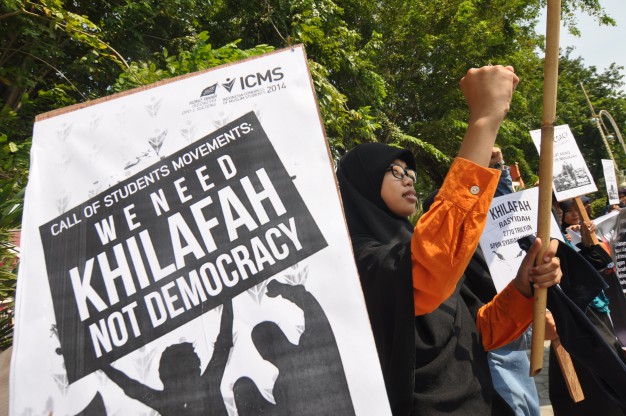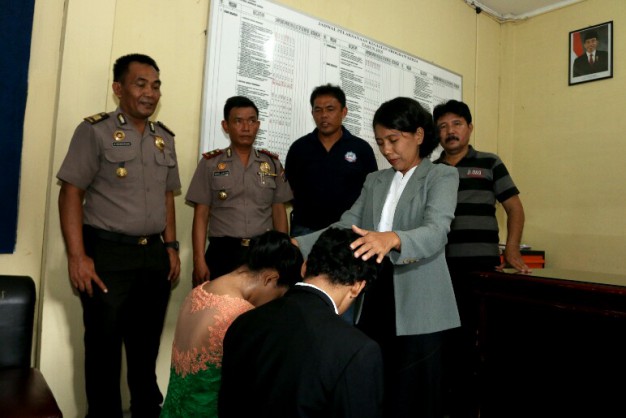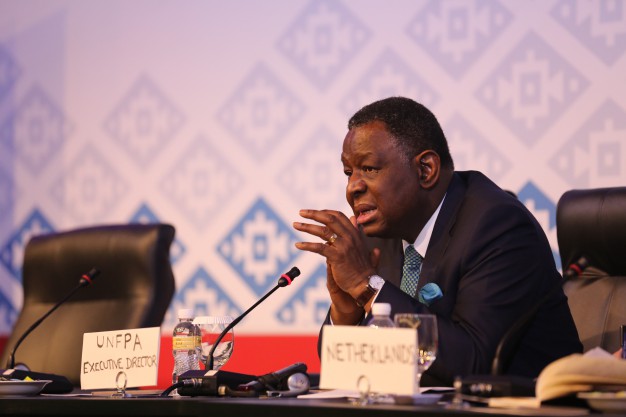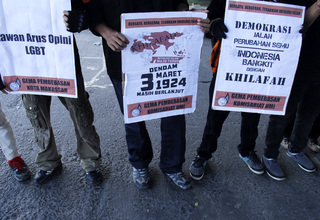Islam and Family Planning in Indonesia: Force for Good or Obstacle to Change?
Jakarta. Family planning experts insist that in countries like Indonesia, there needs to be greater engagement of faith-based communities to make sure everybody’s sexual and reproductive health needs are met. But in this sprawling Muslim-majority archipelago, activists face a variety of challenges. That doesn’t stop them from trying, though, with some pursuing a rights-based approach firmly rooted in religion and co-opting the very Islamic terminology others use to justify the status quo.
“Every human being, whatever way you swing it, has some connection with the unknown,” Undersecretary-General Babatunde Osotimehin, the executive director of the United Nations Population Fund (UNFPA), told the Jakarta Globe in an interview. “We must never underestimate the role of faith in people’s ideas and beliefs, and what they will and will not do.”
Speaking on the sidelines of the International Conference on Family Planning in Bali, which was opened by President Joko Widodo and attended by over 4,400 experts and other stakeholders from all over the world earlier this year, Osotimehin stressed that religion will remain important for many people all over the world.
“This is just not about Catholicism, or Christianity as a whole, it is not about Islam alone, or Buddhism, or whatever,” he said. “Faith is a very powerful force in the world. That is what we need to understand.”
Are two kids enough?
Indonesia is a bustling democracy with an overwhelmingly young population of over 250 million souls, and over 85 percent identifying as Muslims. The major challenges in terms of family planning — and sexual and reproductive health and rights (SRHR) in general — include uneven development, high maternal mortality rates (in many cases due to unsafe abortion) and growing numbers of people living with HIV and Aids, particularly women and youngsters. Related problems are high rates of child marriage and the continued prevalence of female genital mutilation in spite of a government ban.
On the upside, Indonesia’s family planning program — and its well-known motto Dua Anak Cukup (Two Kids Is Enough) — has been very successful since its start in the late 1960s, lowering the total fertility rate (TFR) from 5.6 to 2.6 in recent years. However, the decline has started to stall and the TFR target of 2.1 remains out of reach. Some say this is a consequence of an Islamic revival in the officially secular nation since the fall of strongman Suharto in 1998 and subsequent democratization and decentralization of power.
One of the groups benefiting from greater freedom of speech in Indonesia is Hizb ut-Tahrir, which describes itself as “a political party whose ideology is Islam” and its stated objective is “to resume the Islamic way of life by establishing an Islamic State that executes the systems of Islam and carries its call to the world.”
The organization is not to be confused with the Islamic State movement in Syria and Iraq, which has been denounced publicly both by the international HT organization and by its Indonesian branch, Hizbut Tahrir Indonesia (HTI).

Protesters of Hizbut Tahrir Indonesia call for the establishment of a caliphate, in Palu, Central Sulawesi, on Oct. 10, 2014. (Antara Photo/Mohamad Hamzah)
HTI says a Shariah-based caliphate — to be established through education and other non-violent means — is the only way to properly protect families, especially women and children.
When asked about family planning challenges in Indonesia, Iffah Ainur Rochmah, a spokeswoman for HTI, told the Jakarta Globe that family planning (or tanzim an nasl in Arabic) is allowed in Islam, but not birth control (tahdid an nasl), and only as long as there are no permanent alterations to the body.
The decision to regulate one’s fertility should be made at the family level, Iffah said, and not by the government. The Indonesian government should therefore refrain from portraying families with just two children in a more positive light than families with more than two children. Also, she adds, family planning should not be presented as a solution to solve the problem of poverty.
“Poverty is rooted in the exploitative capitalist economic system that siphons off wealth to benefit a small group of local and foreign people, instead of the people,” explained Iffah. “The root cause of poverty is not the number of residents of this country.”
Although relatively few people in Indonesia would readily subscribe to the far-reaching solution proposed by HTI for some of the most urgent family planning and SRHR issues — a caliphate based on Shariah law — many of the group’s views on the underlying problems are commonly held throughout the archipelago — by Muslims and non-Muslims alike.
Role of the media
Nahdlatul Ulama, the country’s largest socio-religious organization with tens of millions of members, has long played an important role in Indonesia’s family planning program. Apart from educating its members and disseminating religious decrees on the issue, it has also offered contraceptive services at hospitals and clinics, and information at its Islamic boarding schools, or pesantren.
Badriyah Fayumi, deputy chairwoman of NU’s Family Welfare Agency (LKKNU) and a former member of the House of Representatives for the National Awakening Party (PKB), says the main challenges in the field of family planning nowadays include high rates of child marriage and divorce, and the rejection of family planning by some Islamist organizations and political parties campaigning on an Islam-inspired platform.
Since the fall of Suharto and the start of democratization, the decision whether or not to use contraceptives increasingly has to be made at the individual or family level, says Badriyah, who also used to head the Indonesian Commission on Child Protection (KPAI). With the spread of conservative religious views in Indonesia in recent years, the role of progressive religious leaders is becoming more important than ever, she says, adding that positive media coverage of prominent religious figures or celebrities with large families — “five to thirteen children from one wife” — doesn’t help.
Badriyah says the government, civil society and the media need to promote progressive religious views while keeping religious leaders involved at both the national and the local level.
Iffah, meanwhile, also says she is concerned about the role of the media.
According to the HTI spokeswoman, a strong faith needs to be implanted in individuals so that they refrain from violating Shariah law, for instance by having premarital sex or using drugs. A conducive environment needs to be created to enable people to live their lives in line with religious values and common decency, she added.
“It’s not allowed to walk around in public showing your aurat,” Iffah said, referring to the parts of people’s bodies that many observant Muslims believe need to be hidden from view. “The media also have a major role to play in this, as they portray sex outside marriage and dating as an [acceptable] lifestyle, which has to be banned.”
Dealing with HIV and Aids
The government also needs to make sure people can make a decent living, said Iffah, so that they don’t need to resort to pornography, prostitution or drugs to earn money. At the same time, non-permanent contraceptive options should be made available to lawfully married couples, as long as they do not contain substances that Muslims are not allowed to use (such as pork products).
“The goal should be to regulate pregnancies,” Iffah told the Globe. “But to limit the risk of sexually transmitted diseases and HIV/Aids [the use of contraceptives] is not suitable and the failure rate is high.”
“The spread of dangerous diseases should be prevented by putting a stop to promiscuous lifestyles and [searching for] a complete cure,” says Iffah. “The use of contraceptive devices by unmarried couples is forbidden, or haram. The fact that there are risks in engaging in sexual intercourse — such as unwanted pregnancy or the spread of disease — cannot be used as a reason to allow the use of contraception by unmarried couples. That would simply amount to promoting and facilitating promiscuity. We [therefore] reject UN programs to campaign for [making available] contraception, or family planning, to adolescents on reproductive health grounds. This can promote promiscuity, which is already rife in this country.”
However, simply regulating the sale of condoms — widely available in supermarkets throughout Indonesia — is not sufficient, Iffah said. “This has to be accompanied by education, by making the [religious] ban on premarital sex part of the curriculum [in schools], by providing counseling for the people and the cultivation of a pious lifestyle in the context of the family.”
As for those already living with HIV or Aids, the state needs to provide free treatment to people who were infected through blood transfusion, or women who were infected by their husband or children infected by their mother, Iffah said.
HTI is less forgiving for those who contracted HIV in other ways, however.
“People suffering from HIV because of a lifestyle involving sex outside marriage, LGBT or drug use, they should be punished severely based on Shariah principles,” said Iffah. “Because from an Islamic perspective, they are criminals.”
Progressive understanding of Islam
Indonesia’s National Population and Family Planning Board (BKKBN) is already working together with faith-based groups like Badriyah’s NU, but some experts say more is needed to overcome current problems.
“Muslim religious leaders must have the courage to revise Islamic teachings,” says Musdah Mulia, a professor at the Syarif Hidayatullah State Islamic University (UIN) in Jakarta. “And they must have the courage to respond to contemporary issues of modern societies, such as family planning, reproductive health, gender equality and women’s empowerment.”
“Islamic organizations must be at the forefront in campaigning for rational, humanist and progressive Islamic interpretation to be able to realize equal access of Muslim women to family planning programs,” says Musdah, an expert on Islam and gender issues, “and also to liberate Muslim women from ignorance, from poverty and all forms of discrimination and injustice in upholding the essence of Islam in peace and harmony.”

An Arabic reading competition at an Islamic boarding school in Jombang, East Java, on Sunday. (Antara Photo/Syaiful Arif)
However, it is not always a problem of clashing worldviews or religious interpretations that stands in the way of progress, says Ninuk Widyantoro, a psychologist and a co-founder of the Women’s Health Foundation (YKP) who has been advocating on women’s reproductive health issues for decades. Rather, she says, religious leaders sometimes merely lack a good understanding of what sexual and reproductive health is all about — “so you have to approach them.”
“I’ve never been refused by any of the pesantren,” she says, referring to Islamic boarding schools led by prominent religious leaders. “Don’t be afraid to open the dialogue. Don’t be afraid to knock on the door.”
Access to safe abortion
Abortion has been both common and controversial at the same time in the archipelago since before independence. More than two million Indonesian women are estimated to undergo abortions each year nowadays, mostly illegal and often under unsafe conditions.
Abortion is not allowed in Indonesia except in cases of rape, fetal abnormality or when the pregnancy threatens the mother’s life. But even for women facing such harrowing circumstances, Ninuk says the legal battle is actually still being waged.
“It took eight years to approve the [2009] Health Law, including a chapter on reproductive health that mentions abortion,” Ninuk told a forum discussion at the Bali family planning conference in January. “I thought the work was already finished, but then the parliamentarians — because this is a sensitive issue — they asked that just for this chapter we needed a government regulation. It took another five years to finally get the government regulation approved in 2014. Again I thought we were finished, but the last requirement is that we have a guideline for implementation of the regulation. This will likely be finalized soon.”
Ninuk says that in a country like Indonesia, and especially in the cultural context of Java, one has to be very tactful when trying to build a dialogue on issues such as SRHR.
“Abortion is a very sensitive issue, and it is very much related to [people’s] values. You cannot force a doctor, or a community, or leaders to accept this idea. So we have to go slowly.”
Iffah, the HTI spokeswoman, said she believed abortion should not be allowed for the mere reason of a pregnancy being unwanted, unexpected or unplanned.
“Indeed there is Islamic jurisprudence [fiqh] that says it [abortion] is allowed before four months or when [the embryo is] not yet given its soul [making it a human being]. But in practice we have to be very careful with this,” she said “Because most abortion requests are a consequence of sex outside marriage — it is caused by promiscuity. Don’t abuse the Islamic jurisprudence to make it easier to lead a promiscuous lifestyle. We need to close all doors that can lead to sex outside marriage.”

A priest blesses two newlywed youngsters who are currently detained by Medan Police for allegedly carrying out an abortion seven months into the then-unmarried woman’s pregnancy, in January. (Antara Photo/Irsan Mulyadi)
Maria Ulfah Anshor, a commissioner at the Indonesian Commission on Child Protection (KPAI) with a background in various branches of NU, wrote her PhD dissertation on Islamic jurisprudence about abortion.
All religious leaders in Islam — in the four major schools of jurisprudence, or madhhab — agree that abortion is only allowed during the period before the fetus is given its soul, Maria Ulfah explains. If the embryo has already been given its soul, that means it is a living human being and then it can no longer be harmed, except in certain emergency situations.
A major issue of dispute in Islam is when exactly this happens. Some say it happens 120 days after conception, others 40 and yet others stick to periods such as eight or ten weeks — all based on varying interpretations of verses from the Koran or sayings of the Prophet Muhammad, known as hadith.
According to Maria Ulfah it is necessary for organizations like NU to educate people at the grassroots level about family planning and other sexual and reproductive health issues. She says a rights-based approach needs to be used that is based on language and terminology rooted in religion, to give the efforts a better chance of success.
The KPAI commissioner says such an approach is supported by Islamic teachings, as the Koran gives women the right to make decisions about their own bodies, including their reproductive organs. And universal human rights, such as freedom and justice, are also part of Islam, Maria Ulfah stresses.
‘Not fighting against faith leaders’
Apart from rights-based approaches, Islam also teaches people about duty, says M. Amin Abdullah, a professor of Islamic philosophy at the Sunan Kalijaga State Islamic University (UIN) in Yogyakarta.
Similar to the HTI perspective, Amin says that indeed it is essential to move away from the birth control (tahdid an-nasl) perspective and to embrace family planning (tanzim an-nasl), which for instance can also be understood to include birth spacing for the well-being of both mother and child. However, stressing the need for a revitalization of Islamic thought based on a contemporary understanding of the concept of maqasid — or the purpose of the faith — Amin says one of the key responsibilities of mankind is the proper management of Earth and its natural resources.
Environmental destruction, rising pollution levels and climate change, the professor says, point to the need to balance population growth, and that can only be achieved with a well-designed family planning program supported by Muslim religious leaders and a discourse rooted in Islamic thought.
In this, Amin is supported by Risman Musa, a former deputy coordinating minister for people’s welfare who now works as a consultant on reproductive health issues.
“The Indonesian government cannot move without the support of the ulema,” says Risman, referring to Islamic scholars. The government at all levels should therefore maintain solid relationships with Muslim religious leaders, he says, who can then help scale up the country’s family planning program through pre-marriage counseling, or statements at Friday sermons or other religious gatherings.

UN Under-Secretary-General Babatunde Osotimehin is the executive director of of the United Nations Population Fund (UNFPA). (Photo courtesy of UNFPA)
“Partnership will give people a sense of ownership and ensure acceptability and sustainability,” Risman says.
Osotimehin, the UNFPA executive director, also believes religious leaders need to be part of the picture.
“There is no faith that condones death, not one. All faiths are about life. All faiths are about health. All faiths are about the goodness of people,” he says. “In many parts of the world, faith leaders do not oppose family planning — if it is used in union. When it comes to married women, they don’t fight. Maybe one or two might say they don’t believe in the technology, but that is only about the methodology.”
“The only point where there is a bit of controversy, is about women who are not married and whether they can use contraception,” Osotimehin says. “My view is this: you need to teach them, and all young people — boys and girls — about their bodies. So they know about what is going on. So they know about prevention of pregnancy and prevention of HIV, prevention of STIs [sexually transmitted infections].”
“If you do that effectively, you might prevent a lot of pregnancies, because people understand their vulnerabilities. In my sense, they should be able to access contraceptives, like condoms, but this is the way to break it up. Otherwise you get a situation where we are fighting against faith leaders, while we are not. We need to work with them, to make sure that we preserve life.”
Sumber: http://jakartaglobe.beritasatu.com/human-rights-news/islam-family-planning-indonesia-force-good-obstacle-change/
